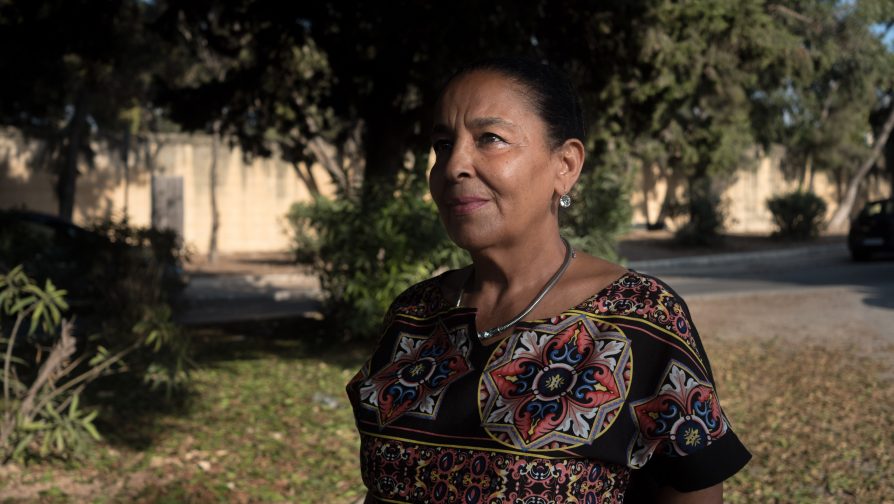Fleeing the Libyan conflict zone in 2015, gynecologist Badria El Baghawi allowed herself to make a home out of Malta as a refugee, after previous visits during calmer and happier times.
Badria El Baghawi. © UNHCR/Joanna Demarco
An unexpected return
When Libyan gynecologist Badria El Baghawi left her native country for Malta in 2015, she was not stepping into entirely unfamiliar territory.
“I used to visit Malta as a tourist all the time,” she recalls. “As far back as 1986. I remember the old buses. I remember when Valletta was deserted, when there were barely any shops! It was so much more peaceful back then,” she says with a wistful smile, before conceding that change is inevitable.
“Malta was colonised by so many people over and over again, and now it wants to assert itself as an independent country. I can understand that…”
Perhaps this is because autonomy and independence are familiar struggles for Badria, who has had to weather enormous upheavals in the wake of the Libyan civil war, triggered during the twilight years of the Gaddafi regime.
“I have a sixth sense about these things, I knew the situation in Libya was only going to get worse”
Safely covered up with face masks, we conduct the interview in Italian, which Badria is fluent in after having learnt it in school, and, furthermore, having studied Medicine in Palermo in the mid-‘80s. She subsequently enjoyed a successful career, having worked in Italy, Switzerland, the United Kingdom as well as, of course, in Tripoli, where she was also employed in a number of embassies.
“I was doing very well in Libya back then. I had my own driver, my own cook, my own waiter. But, of course, the war changed all that.”
Listening to the sixth sense
Badria is not in a position to go into too much detail on the incidents that led her to seek out refugee status in Malta, which arose as a direct side-effect of the destabilization that followed in her country of origin. Suffice it to say that her remaining was no longer an option, and she took a flight to Malta in September of 2015. Badria then applied for asylum and was granted protection as a refugee. “I have a sixth sense about these things, I knew the situation in Libya was only going to get worse.”
And as luck (or fate) would have it, Badria – a doctor specialising in gynecology – had been registered with the Malta Medical Council since 2010. “Because I visited Malta so often, I figured I may as well sign up, since you never know…” This helped give Badria some professional legitimacy when she went to the Health Ministry upon her arrival to Malta, the first leg of her job-hunt.
She took up a position at St Luke’s Hospital for one year. After that contract ran its course, she joined a local private clinic, where she worked for three years before the business folded.

Badria El Baghawi. © UNHCR/Joanna Demarco
Adapting to new realities
“Now I work as a cleaner, on a sporadic basis. It’s honest work, don’t get me wrong.” In fact, Badria is bemused by her own sister’s reaction to her current economic position.
“Now, after all these years, I know what I’m worth”
“She’d tell me: ‘don’t go around telling other Libyans in Malta that you work as a cleaner… they’ll tell everyone back home. Think of your prestige!’ I left my ‘prestige’ back in Libya, I tell her,” Badria says, decrying the ‘ugly mentality’ that props up such social hang-ups.
“The truth is that I’ve never much cared about what people say about me,” she says. “Because when they leave, and when I close the front door behind them, they’re not the ones who get to see my intimate struggles. They’re not the ones who see me cry. So I’m not interested in them. It’s not that I’m arrogant. It’s just that now, after all these years, I know what I’m worth.”
The bigger picture
Badria does not shy away from the melancholy that colours her story as she recounts it to me. There is disappointment here, and even some understandable bitterness: forging a new life in a new country is not easy, particularly at her age, and particularly when you cannot reconnect to the same professional pathways you’ve enjoyed earlier. But she expresses her woes with the most articulate dignity, lending an air of self-awareness to her plight.
It is also a viewpoint that affords her a glance at the bigger picture.
“The only problem I have right now is that my work as a cleaner is sporadic. At my age, I need consistent employment. Work distracts you from your troubles, and it keeps you moving. I don’t like sitting still.”
And not sitting still is, arguably, one of the best antidotes to despair.
Share on Facebook Share on Twitter